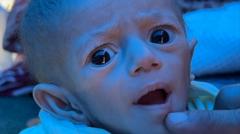In the dire setting of war-torn Gaza, children are trapped in a world devoid of joy and filled with an all-consuming hunger. As the camera pans through the devastated landscape, the lifeless expressions of these children reflect their grim reality, where despair has become the norm. For nearly 19 months, these communities have endured the continual assaults and crippling impacts of the Israeli blockade. The stark scenes of families waiting in line for essential supplies, often returning empty-handed, tell a story that words can barely capture.
Among those affected is Siwar Ashour, a five-month-old baby whose fragile frame weighs only slightly more than half of what it should for her age. She had caught the attention of a local cameraman for the BBC during his harrowing documentation of the ongoing humanitarian crisis. Moved by her plight, he sought out Siwar after learning she had been discharged from Nasser hospital in Khan Younis, where she had once been under medical care.
In an eerie atmosphere filled with uncertainty, many families, including Siwar's, are struggling with immense hardships. Her mother, Najwa, describes the agonizing conditions they face daily. Due to her baby's severe allergies and the blockade that limits aid, they are unable to find the specialized milk formula crucial for Siwar's health. “The doctors told me that Siwar improved and is better than before, but I think that she is still skinny and hasn’t improved much,” Najwa laments, holding back the reality of her daughter's declining health.
The situation worsens as Najwa confronts insects swarming around her precious child, forcing her to take desperate measures to shield Siwar from harm. The sounds of war envelop the household - deafening artillery and distant explosions are daily reminders of the danger surrounding them, leaving the little girl startled and frightened.
Compounding these struggles, Najwa's own malnutrition and that of her mother, Reem, limits their ability to care for Siwar adequately. They grapple with the dual challenges of providing for their infant's needs while struggling to find essential food and clean water. “In our case, we can't provide milk or diapers because of the prices and the border closure,” Najwa expresses, her clarity dimmed by exhaustion.
Despite claims by the Israeli military insisting that there is no food shortage in Gaza, multiple aid agencies and the United Nations have sounded alarms about severe food scarcity and the humanitarian crises plaguing the region. As international discourse continues to note the grim realities faced by civilians, many remain ensnared in the complex web of an ongoing conflict, left to navigate through their suffering with little indication of hope.
The haunting reality for families like Najwa and Siwar reflects the continuous anguish of the 2.1 million people still residing in Gaza, as they face the overwhelming question: how to survive each passing day amidst relentless adversity. As Najwa poignantly states, “One does not think about the future or the past. There is only the present moment and how to survive it.”



















